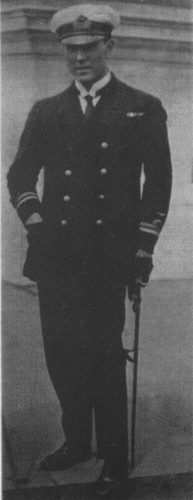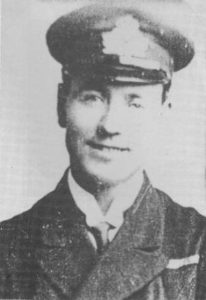- Author
- Stevens, Errol
- Subjects
- Biographies and personal histories, Naval Aviation, History - WW1
- Tags
-
- RAN Ships
- None noted.
- Publication
- December 1996 edition of the Naval Historical Review (all rights reserved)
The nick name Breguet stuck until he joined No 40 RFC Squadron in 1918 when he became known as the Admiral because of his R.N.A.S. back ground.
Between May 19 and 22 the Germans dropped nearly 400 bombs on Dunkirk. On May 21 Dallas and one other R.N.A.S. pilot caught up with the German raiders and shot down two, one of which went down trailing smoke whilst the fuselage of the other broke completely in two.

Dallas and four other R.N.A.S. pilots were specially selected during this period to collect new French aircraft from near Paris and then go to assist the French Army, in the Verdun area. Here Dallas met the first French ace Navarre and discussed tactics with him. On the return journey to rejoin his squadron, Dallas and one other pilot established a long distance record for that aircraft type. For his services in the Verdun area he was awarded the Croix de Guerre avec Palme on July 24 by the French Government.
On June 30, he was promoted to Flight Lieutenant and in the next month the prototype Sopwith Triplane (N500) was sent to No. 1 Squadron for operational testing. It was a radical development giving superb operational manoeuverability and rate of climb with its main drawback being lack of fire power as it had only one machine gun. However, Dallas achieved 3 victories in the prototype.
On September 6, he was awarded the Distinguished Service Cross for his courage and skill. During December No. 1 squadron started re-equipping with production Sopwith Triplanes and on December 31, he was promoted to Flight Commander.
1917
Because of a plea for assistance Naval One moved from Dunkirk to the Western Front and came under R.F.C. control in January. Dallas now really started to excel with the Triplane mainly in N5436 and his score mounted rapidly. The squadron was closely involved with the battles of Arras, Bullencourt, Messines, Ypres and Passchendaele.
As reported in “The Fighting Triplanes” during “Bloody April” more than 300 British air crew, mainly R.F.C., were posted killed, or missing. This was a third of the pilots actively involved in the area. On April 21, Dallas and another pilot attacked 14 German aircraft consisting of 2 seaters and protecting fighters. During a dog fight which lasted nearly an hour they shot down 3 German aircraft and forced the remainder, to retire behind the German lines. Apart from aerial combat Naval One was involved with ground strafing and the squadron daily reports often stated that one or more aircraft returned riddled with bullet holes.
In the period April 22 to May 5 Naval One engaged 175 aircraft in 95 offensive patrols and shot down 16 enemy aircraft. The achievements of Dallas in particular were remarkable during this period; unassuming and modest, he frequently failed to submit claims for victories.
On June 14 he was promoted to Acting Squadron Commander and appointed Commanding Officer of Naval One. On June 22 he was awarded a bar to his DSC and on June 30 was confirmed as a Squadron Commander.
In October the squadron was re-equipped with Sopwith Camels to replace the Triplanes. The Camel had two forward firing machine guns and was a match for any German aircraft if properly handled. A Mention in Despatches from Field Marshal Haig was awarded to Dallas on November 7 “for gallant and distinguished services in the field”. In December Naval One returned to the Dover area for a well-deserved rest and refit.
1918

Whilst in the Dover area he flew two Home air defence sorties against Zeppelins in January and by February the squadron with its Camels was back on the Western Front. During March he shot down another German aircraft to bring his total to about 30, and also a kite balloon.
On March 14 he was posted as Commanding Officer of No. 40 Squadron R.F.C. at Bruay in France. This was most unusual for an R.N.A.S. officer to be sent to command an R.F.C. squadron, but morale in No. 40 was low and Dallas had an outstanding leadership record. He left Naval One on March 17 and in spite of Naval Regulations which prohibit gifts to senior officers for obvious reasons, his officers presented him with an engraved silver tray as a token of their deep admiration. He was relieved by Squadron Commander C D Booker DSC, C de G, who had spent most of his school days at Melbourne Grammar.




